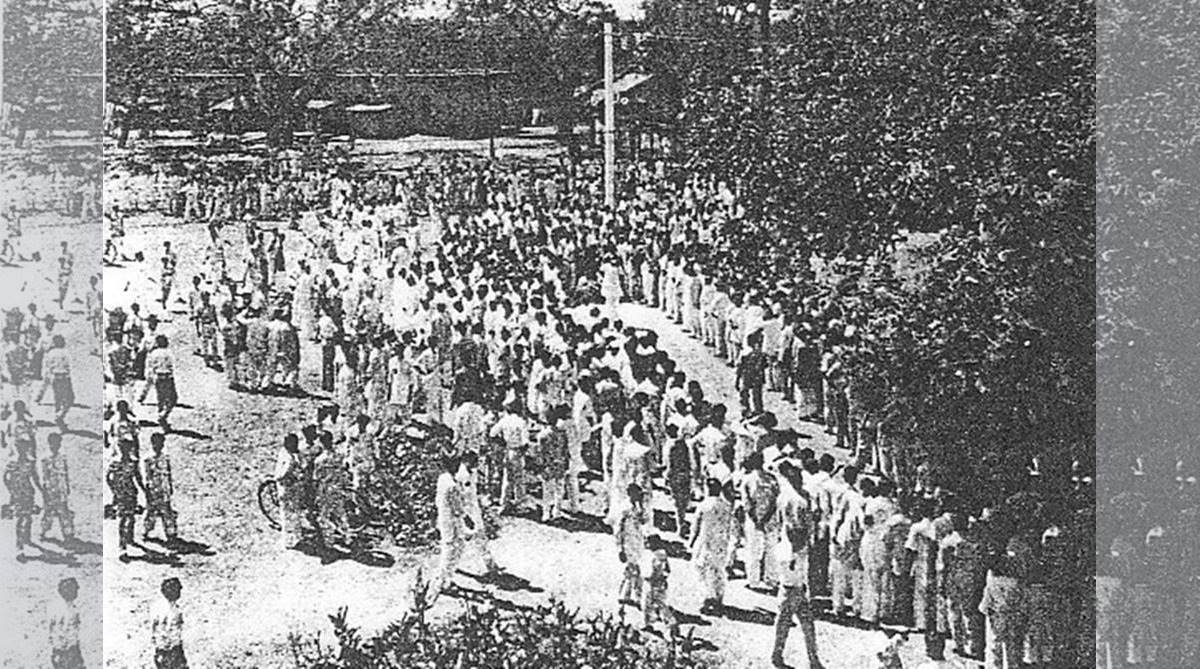First off, here's Mousumi Bhowmick with her surreal rendition of Ami sunechhi sedin tumi (I heard the other day you..) an anthem to isolation and loneliness with what the Bengalis would call great Bhaab (expression)...
And for a different mood altogether, the band Bhoomi (Land/Earth) with their uber popular Barandaye Roddur (Sunlight on the balcony)...
Here's another number from a Kolkata band called Blood...again a
different genre and mood - Tumi thakbe ki? will you be
there?
And finally,
here's Bay of Bengal from Bangladesh, with Je
Shohore Ami Nei...the city where I am not present. Enjoy!
Bengali Blood and Blood for Bengali
One
Bengali is a poet, two Bengalis is a film society,
Three
Bengalis is a political party, four Bengalis is two political parties.
~ Old hat meme, but sums up
Bengalis’ love for their language, arts & politics!
14th
August midnight, 1947. Pakistan was
born, a new country carved out of previous British India, its two wings - West
Pakistan and East Pakistan, separated by linguistic, ethnic, and vast
geographical distances, united by a common religion.
At
independence, East Pakistanis (overwhelmingly Bengali speakers) represented
roughly 56% of the total Pakistani population, i.e. the majority. The capital
of the new country was Islamabad and the national language was Urdu, the
language in which all government business was conducted. East Pakistanis wanted
equal status for Bengali, the demand being tabled by a Bengali opposition
legislator in early 1948. It was shot down. The Pakistani Prime Minister Liaqat
Ali Khan was outraged.
A
month later, Jinnah, the architect and the leader of Pakistan, visited Dhaka.
At a gathering at the University, he made it clear that Urdu would remain the
national language. Dhaka University students erupted in strikes and
protests.
 |
| Credit |
Things
spiralled out of control in 1952. A general strike was called on 21st
February - a procession planned to take the demand for Bengali to the East
Pakistan Legislative Assembly. The authorities banned demonstrations and
prohibited a gathering of more than four people. Students, however, gathered in
large numbers at the Dhaka University grounds, a group attempted to get to the
nearby Assembly building. The police promptly opened fire. Several injuries
resulted, five deaths, including a child. The first blood had been spilt for
the Bengali cause. Dhaka, and the wider province, exploded in fury.
 |
| Credit |
Ekushe, the 21st, is marked with due solemnity in many ways in Bangladesh. It was of course the inspiration for much nationalistic/patriotic poetry and songs, one among them famous across the world – Amar bhaiyer rokte rangano Ekushe Phebruyari, ami ki bhulite pari? How can I forget 21st February painted red with my brother’s blood? There is a civilian medal called Ekushe Podok in Bangladesh, the Martyr’s Monument is dedicated to Ekushe, and in 1999 UNESCO announced Ekushe as the International Mother Language Day.
The
Bengali speakers of Bangladesh have had to sacrifice an entire generation for
the right to speak their language – not many nations can claim this distinction. Here is a documentary from Bangladesh outlining the story of Ekushe, but unfortunately it has no subtitles so can be appreciated only by those who follow Bengali.
Posted for the A-Z Challenge 2019


Politics. Sigh. Playing with other's lives...
ReplyDeleteI hadn't realised that the Bengalis were denied their language for so long. Thank you.
Ya, nearly 25 years. East Pakistan got a raw deal, but they weren't having that.
DeleteBeautiful and heart wrenching
ReplyDeleteThank you.
Deletequite a history. I had not idea. Language is so key to identity. Tough to be stifled for so long.
ReplyDeleteLanguage is the cornerstone of identity indeed. So many have been lost because of conquest and colonialism. Even now, there are language losses every year. Thank goodness Bengali escaped that fate.
DeleteYou picked some rocking tunes - I like it!
ReplyDeleteGlad you enjoyed them! The Bengalis create some awesome music.
DeleteThe desire to control totally causing so much violence. I've read more about the 1947 partition violence, but I know someone who was involved in the struggle for Bangladesh.
ReplyDeletehttp://findingeliza.com/
The Partition was before my generation was born, so we've got the stories second hand. Many people didn't really speak of the trauma at all. But the Bangladesh War happened in my lifetime and I have friends from there who have lost family members in it or been affected in other ways. I myself wasin Delhi at the time and have clear memories of the black out and going to hear Sheikh Mujibur Rahman address the crowds at Delhi when he was flying back to Dhaka from London after he was released. Very clear, very close.
DeleteEkdum Bhalo post! Bengali language almost always sounds mishti. Really enjoyed the post.
ReplyDeleteLooking forward to read upcoming A to Z posts.
Jui Positive Cookies
Enjoyed the Bangla comment, thank you!
Deleteand here i take speaking English for granted. that's amazing how much they had to fight to speak Bengali. :o
ReplyDeleteJoy at The Joyous Living
Suppression of language often isn't just about language. Nobody should take their freedoms for granted - massive numbers of people have lost their lives fighting for them.
DeleteSuch an interesting history lesson. How profoundly sad about the language loss.
ReplyDeleteThey could have, but they didn't lose it finally, thank goodness. The language martyrs ensured that.
DeleteDifficult times. The history should be more widely known, especially since there is such a strong diaspora in the West. Glad you enjoyed the music, thank you.
ReplyDeleteBah khoob bhalo post!
ReplyDeleteDhonnobad.
DeleteI liked reading that detailed historical account. I don't think many people know about this. Glad you shared this.
ReplyDeleteYou post also shows how strong is the emotional bond one has to one's language. In fact, many social and political troubles have erupted because of the inability of the leaders to handle sensitively issues regarding language.